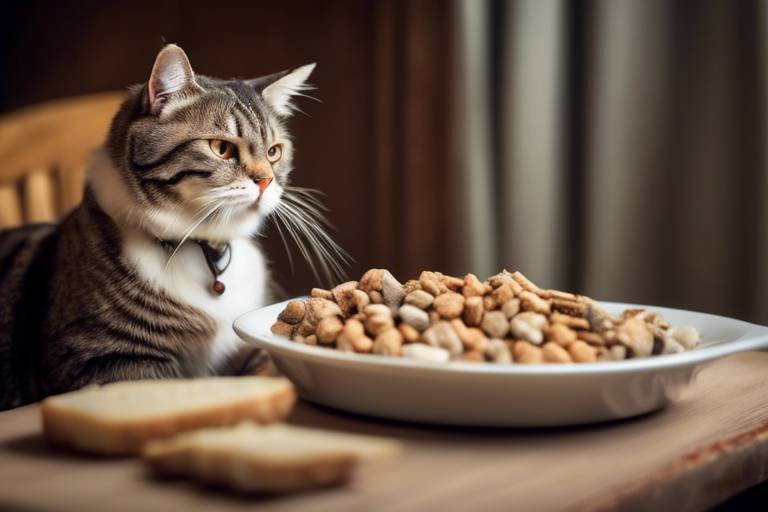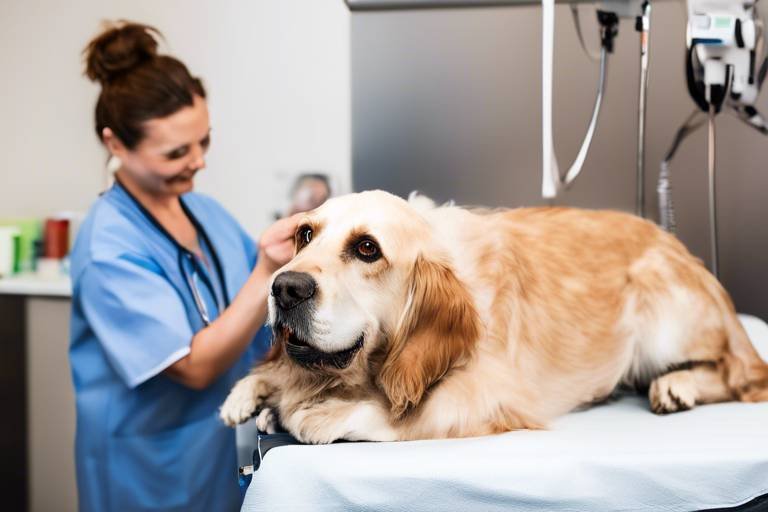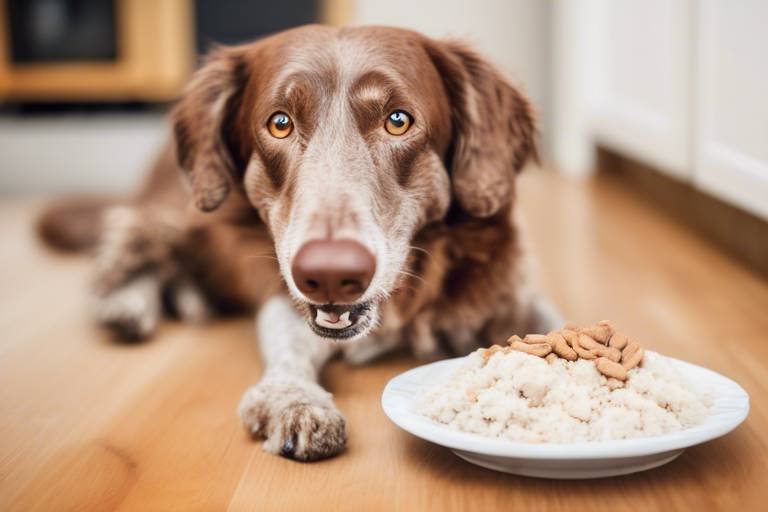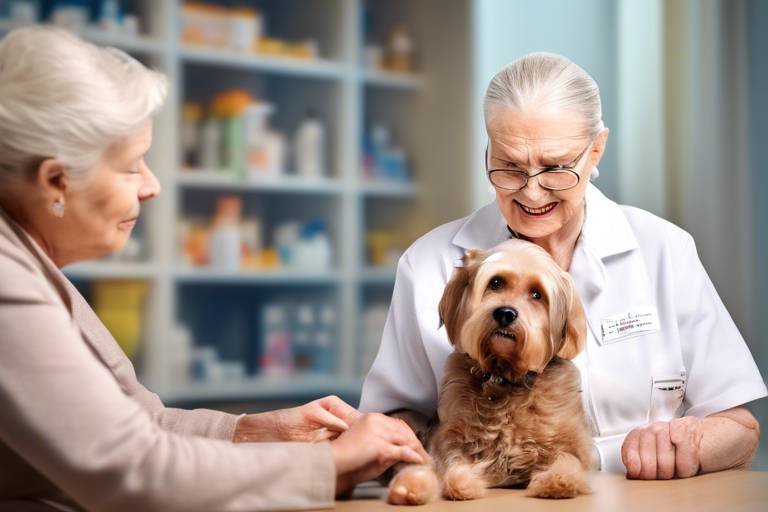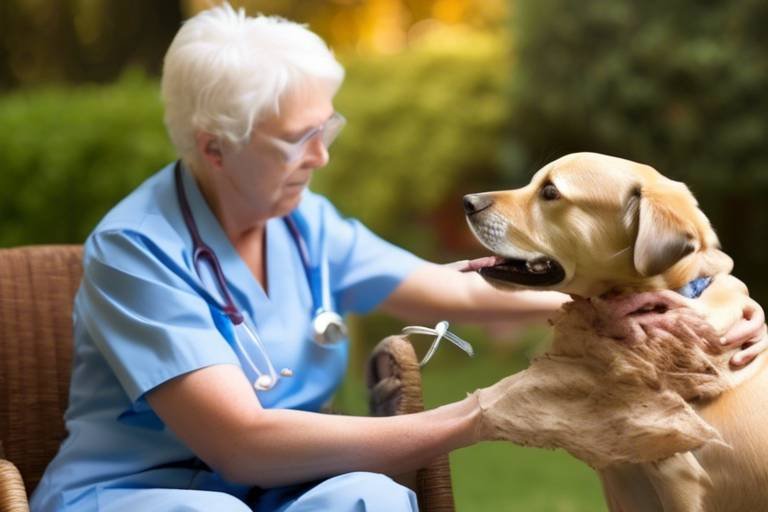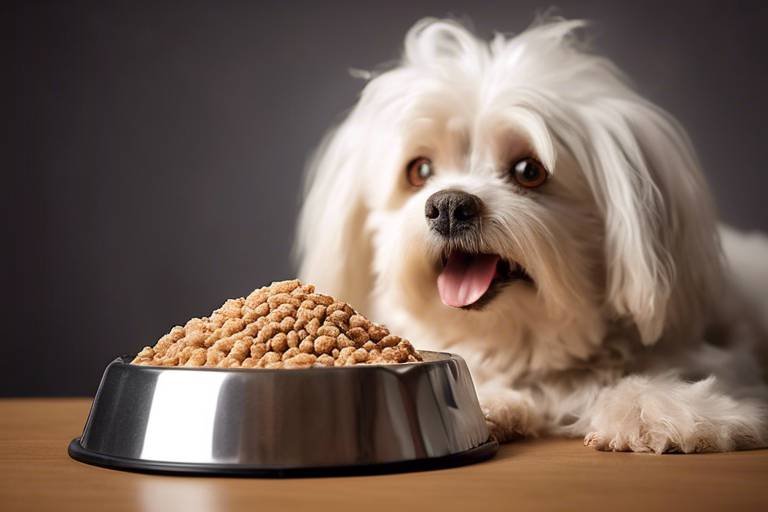How to Help Your Senior Pet Maintain Dental Health
As our furry friends age, their needs change, and dental health becomes a critical aspect of their overall well-being. Just like us, pets can suffer from a variety of dental issues that can lead to serious health problems if left unchecked. So, how can you ensure that your senior pet maintains a sparkling smile and healthy gums? The journey to good dental health starts with understanding the importance of oral hygiene, recognizing the signs of dental problems, and implementing effective preventive measures. In this article, we will explore various strategies that can help keep your senior pet's mouth healthy and vibrant.
Understanding why dental health is crucial for senior pets can help owners take proactive measures. Poor dental hygiene can lead to serious health issues, including infections and systemic diseases. Did you know that bacteria from dental disease can enter the bloodstream and affect vital organs like the heart and kidneys? This makes it essential to prioritize your pet's dental care. Just as you wouldn’t ignore a toothache, your pet deserves the same attention. Regular dental check-ups can catch problems early, allowing for timely treatment and a happier, healthier life for your furry companion.
Recognizing the signs of dental issues in senior pets is essential for timely intervention. Common indicators include bad breath, difficulty eating, and excessive drooling. If you notice your pet hesitating to chew their favorite treats or showing discomfort when you touch their mouth, it might be time for a veterinary check-up. Early detection can save your pet from unnecessary pain and suffering. Remember, our pets can’t tell us when something is wrong, so it’s up to us to be vigilant and proactive.
Older pets are prone to various dental diseases, including periodontal disease and tooth decay. Awareness of these conditions can help owners seek appropriate treatment and preventive measures. Periodontal disease, for instance, is often the result of plaque buildup and can lead to severe gum inflammation and tooth loss. Meanwhile, tooth decay can significantly affect a senior pet's quality of life, causing pain that may prevent them from enjoying their meals or playing as they used to.
Periodontal disease is a prevalent issue in senior pets, caused by plaque buildup. Understanding its stages can aid in early detection and effective management to prevent further complications. The stages range from gingivitis, which is reversible, to advanced periodontal disease, which can lead to tooth loss and systemic health issues. Regular dental cleanings and at-home care can help keep this disease at bay. Think of your pet's mouth as a garden; if you don’t tend to it regularly, weeds (or in this case, plaque) will take over!
Tooth decay can significantly affect a senior pet's quality of life. Recognizing the symptoms and seeking veterinary care can help alleviate pain and prevent infections. Symptoms may include visible holes in the teeth, swelling around the gums, and a noticeable change in eating habits. If your pet seems less enthusiastic about mealtime, it’s time to investigate further. Just like us, pets can suffer from the discomfort of cavities, and the sooner you address it, the better for your furry friend.
Implementing preventive care practices can significantly improve dental health in senior pets. Regular brushing, dental treats, and professional cleanings are vital components of an effective oral hygiene routine. Brushing your pet’s teeth may sound daunting, but with the right tools and techniques, it can become a bonding experience. Consider using pet-friendly toothpaste and a soft-bristled toothbrush. Also, don’t forget about dental treats! These not only help clean the teeth but can also be a delightful reward for your pet.
Diet plays a significant role in maintaining dental health for senior pets. Choosing the right food and treats can help reduce plaque buildup and promote healthier teeth and gums. A well-balanced diet rich in nutrients can also support your pet’s overall health, making them more resilient against dental diseases. It’s like fueling a car; the better the fuel, the better the performance!
Selecting dental-friendly pet food can aid in reducing tartar and plaque buildup. Look for products specifically formulated to support oral health in senior pets. Many brands offer kibble that is designed to scrub teeth as your pet chews. It’s a two-for-one deal: they get to enjoy their meal while also caring for their teeth!
Dental chews and treats can provide a fun and effective way to promote dental hygiene. These products help mechanically clean teeth while also offering nutritional benefits for senior pets. When selecting dental chews, look for those approved by veterinary dental associations, as they are designed to be safe and effective. Think of them as the dessert that’s actually good for you!
- How often should I brush my senior pet's teeth? Ideally, you should brush your pet's teeth daily, but even a few times a week can make a significant difference.
- What are the signs that my pet needs a dental cleaning? Signs include bad breath, difficulty eating, swollen gums, and noticeable tartar buildup.
- Can I use human toothpaste for my pet? No, human toothpaste contains ingredients that can be harmful to pets. Always use toothpaste specifically designed for pets.
- Are dental treats effective? Yes, dental treats can help reduce plaque and tartar buildup, but they should not replace regular brushing.

The Importance of Dental Health for Senior Pets
When it comes to our furry companions, dental health is often an overlooked aspect of their overall well-being, especially for senior pets. As pets age, their dental hygiene becomes even more critical. Just like humans, pets can suffer from a variety of dental issues that can lead to serious health problems. It’s not just about having a pretty smile; it’s about keeping your pet healthy and happy! Poor dental hygiene can lead to painful infections, tooth loss, and even systemic diseases that affect vital organs like the heart and kidneys.
Did you know that studies have shown that over 80% of dogs and 70% of cats show signs of dental disease by the age of three? That’s a staggering number! So, what can you do as a responsible pet owner? First off, understanding the importance of dental care is crucial. Regular check-ups and cleanings can help prevent the buildup of plaque and tartar, which are the primary culprits behind dental diseases.
Moreover, maintaining good dental health can enhance your senior pet's quality of life. Imagine trying to enjoy your favorite meal while suffering from a toothache. It’s no different for our pets! When their mouths are healthy, they can eat comfortably, play without pain, and enjoy their golden years to the fullest. A healthy mouth can also lead to better overall health, as it reduces the risk of bacteria entering the bloodstream, which can cause serious issues elsewhere in the body.
In summary, prioritizing dental health for senior pets is not just a matter of aesthetics; it's a vital part of their health care regimen. Regular dental check-ups, at-home care, and a proper diet can make a world of difference. Remember, an ounce of prevention is worth a pound of cure!

Signs of Dental Problems in Senior Pets
As our furry companions age, their dental health becomes an increasingly important aspect of their overall well-being. It’s essential for pet owners to be vigilant and recognize the signs of dental problems early on to ensure timely intervention. Just like humans, pets can suffer from a variety of dental issues that can lead to discomfort and serious health complications if left untreated. So, what should you look out for?
One of the most common indicators of dental problems in senior pets is bad breath. While a bit of doggy breath is normal, a strong, persistent odor can signal underlying issues such as periodontal disease or tooth decay. If your pet's breath smells like something died, it’s time to consult your veterinarian. Another sign to be aware of is difficulty eating. If your once-enthusiastic eater suddenly becomes picky or struggles to chew their food, it could be a sign that their teeth or gums are causing them pain. This can lead to further health issues due to inadequate nutrition.
Excessive drooling is another red flag. While some drooling is typical, especially in certain breeds, a sudden increase in saliva production can indicate dental problems. Pay attention to whether your pet is drooling more than usual, as this could point to discomfort or pain in their mouth.
Additionally, keep an eye on your pet's behavior. If they start to favor one side of their mouth while eating or show signs of distress when you touch their face, it's a clear signal that something might be wrong. Changes in grooming habits can also be telling; if your pet is no longer grooming themselves as thoroughly, they may be experiencing discomfort that prevents them from doing so.
Lastly, swelling or redness in the gums is a significant sign of dental issues. Healthy gums should be pink and firm, so any changes in color or texture should prompt a visit to the vet. If you notice any of these symptoms in your senior pet, don't hesitate to schedule an appointment. Early detection is key to preventing more severe health problems down the road.
In summary, being proactive about your senior pet's dental health can lead to a happier, healthier life. Regular check-ups and being aware of these signs can help you catch problems before they escalate. Remember, your pet relies on you to keep them healthy, so stay informed and attentive!
- What are the common signs of dental problems in senior pets? Look for bad breath, difficulty eating, excessive drooling, favoring one side of the mouth, and changes in grooming habits.
- How often should I take my senior pet to the vet for dental check-ups? It's recommended to have dental check-ups at least once a year, but consult your vet for a tailored schedule.
- Can I prevent dental problems in my senior pet? Yes! Regular brushing, dental treats, and professional cleanings can significantly reduce the risk of dental issues.
Common Dental Diseases in Older Pets
As our furry companions age, their dental health often becomes a significant concern. Just like humans, pets can suffer from a variety of dental diseases, which can lead to discomfort and serious health issues if left untreated. Understanding these common conditions is crucial for pet owners, as it enables them to take proactive steps to maintain their pet's oral hygiene. The two most prevalent dental diseases affecting older pets are periodontal disease and tooth decay.
Periodontal disease is often the first dental issue that arises in senior pets. It begins with the buildup of plaque—a sticky film of bacteria that adheres to the teeth. If not removed through regular brushing or dental cleanings, this plaque can harden into tartar, leading to inflammation of the gums, known as gingivitis. If gingivitis progresses, it can develop into periodontal disease, which can cause severe damage to the structures that support the teeth, including the bone. The symptoms of periodontal disease may include:
- Swollen or bleeding gums
- Pain while eating
- Bad breath
- Loose teeth
On the other hand, tooth decay is another common concern for senior pets. This condition occurs when the enamel of the tooth is eroded, often due to a diet high in carbohydrates and sugars. Once the enamel is compromised, bacteria can invade the tooth, leading to infection and even tooth loss. Symptoms of tooth decay can include:
- Visible holes or dark spots on the teeth
- Increased sensitivity to hot or cold
- Difficulty chewing or reluctance to eat
Being aware of these conditions is the first step in ensuring your senior pet's dental health. Regular veterinary check-ups are essential, as they can identify early signs of these diseases before they escalate into more serious problems. Additionally, maintaining a consistent dental care routine at home can help prevent these issues from developing in the first place. Remember, a healthy mouth contributes to a healthy pet, so taking the time to care for your senior pet's dental health is not just a luxury—it's a necessity!
Q: How often should I brush my senior pet's teeth?
A: Ideally, you should brush your pet's teeth daily. However, if that isn't feasible, aim for at least two to three times a week to maintain good oral hygiene.
Q: Are there specific dental treats I should give to my senior pet?
A: Yes! Look for dental treats that are specifically designed to reduce plaque and tartar buildup. These treats often have a texture that helps clean the teeth as your pet chews.
Q: How can I tell if my pet is experiencing dental pain?
A: Signs of dental pain can include difficulty eating, excessive drooling, pawing at the mouth, or changes in behavior, such as increased irritability or withdrawal.
Q: When should I take my pet to the vet for dental issues?
A: If you notice any signs of dental disease, such as bad breath, swollen gums, or difficulty eating, it’s essential to schedule a veterinary appointment as soon as possible for a thorough examination.
Periodontal Disease
Periodontal disease is one of the most common dental issues affecting senior pets, and it can have serious implications for their overall health. This condition begins with the formation of plaque, a sticky film of bacteria that accumulates on the teeth. If not removed through regular brushing or dental care, plaque hardens into tartar, leading to inflammation of the gums—a condition known as gingivitis. Over time, if gingivitis is left untreated, it can progress to periodontal disease, where the infection spreads deeper into the supporting structures of the teeth, including the bone.
Understanding the stages of periodontal disease is crucial for pet owners. The stages can be categorized as follows:
| Stage | Description |
|---|---|
| Stage 1: Gingivitis | Gums are inflamed but no bone loss has occurred. Bad breath may be noticeable. |
| Stage 2: Early Periodontal Disease | Gums begin to recede, and there is mild bone loss. Pets may show discomfort while eating. |
| Stage 3: Moderate Periodontal Disease | More significant gum recession and bone loss. Pets may experience pain and difficulty chewing. |
| Stage 4: Advanced Periodontal Disease | Severe gum recession and extensive bone loss. This stage can lead to tooth loss and systemic infections. |
As a pet owner, it's important to recognize the signs of periodontal disease early. These may include persistent bad breath, red or swollen gums, difficulty eating, and even behavioral changes such as irritability or withdrawal. If you notice any of these symptoms, a visit to the veterinarian is essential. They can perform a thorough dental examination and recommend appropriate treatments, which may include professional cleanings or even surgery in advanced cases.
Preventing periodontal disease is far easier than treating it. Regular dental check-ups and at-home care can significantly reduce the risk. Brushing your pet’s teeth, providing dental treats, and ensuring they have regular veterinary cleanings can all contribute to maintaining their oral health. Remember, a healthy mouth is not just about fresh breath; it's about ensuring your beloved pet lives a long, happy, and healthy life.
- How often should I brush my senior pet's teeth? Ideally, you should brush your pet's teeth daily, but even a few times a week can make a significant difference.
- What are the signs of periodontal disease? Look out for bad breath, red or swollen gums, difficulty eating, and excessive drooling.
- Can periodontal disease affect my pet's overall health? Yes, periodontal disease can lead to serious health issues, including heart, liver, and kidney problems.
- Are dental chews effective for preventing dental disease? Yes, dental chews can help reduce plaque and tartar buildup while providing a tasty treat for your pet.
Tooth Decay
Tooth decay in senior pets is a serious concern that can significantly impact their overall health and quality of life. Just like in humans, tooth decay occurs when bacteria in the mouth produce acids that erode the tooth enamel, leading to cavities and pain. For our beloved furry companions, this can mean discomfort while eating, leading to a decreased appetite and potential weight loss. Imagine how frustrating it must be for them to enjoy their favorite treats but be unable to do so because of dental pain!
One of the most alarming aspects of tooth decay is that it often goes unnoticed until it has progressed to a more severe stage. Many pet owners may not realize their pet is suffering until they notice signs such as excessive drooling, difficulty chewing, or even visible holes in their pet's teeth. Just like we wouldn't ignore a toothache, it's crucial for pet owners to stay vigilant about their senior pets' dental health. Regular veterinary check-ups can help catch these issues early on, preventing further complications.
Symptoms of tooth decay can include:
- Bad breath: A telltale sign that something is wrong in your pet's mouth.
- Pain while eating: If your pet is hesitant to chew or drops food, it may be due to dental pain.
- Changes in behavior: Increased irritability or withdrawal can indicate discomfort.
Tooth decay not only affects the teeth but can also lead to more serious health issues if left untreated. Bacteria from decayed teeth can enter the bloodstream, potentially affecting the heart, liver, and kidneys. This is why proactive dental care is essential for senior pets. Regular dental cleanings, appropriate dental diets, and at-home care can help combat the onset of tooth decay.
In conclusion, paying attention to the signs of tooth decay and implementing preventive measures can greatly enhance your senior pet's quality of life. It’s all about keeping those tails wagging and ensuring they can enjoy their golden years without the pain of dental issues!
Q: How can I prevent tooth decay in my senior pet?
A: Regular dental check-ups, brushing their teeth, and providing dental-friendly food and treats can help prevent tooth decay.
Q: What are the signs that my pet may have tooth decay?
A: Look for bad breath, difficulty eating, excessive drooling, or changes in behavior, which may indicate dental pain.
Q: Is professional dental cleaning necessary for my senior pet?
A: Yes, professional dental cleanings are crucial for removing plaque and tartar that at-home care may miss, especially in senior pets.
Preventive Care for Dental Health
When it comes to keeping your senior pet's teeth and gums in tip-top shape, preventive care is the name of the game. Just like we humans visit the dentist regularly to keep our smiles bright and healthy, our furry companions need a similar level of attention. The good news? There are several effective strategies that pet owners can adopt to ensure their senior pets maintain excellent dental health throughout their golden years.
First and foremost, regular brushing is crucial. It might sound daunting, but with a little patience and practice, you can make it a part of your pet's routine. Aim to brush your pet's teeth at least a few times a week, if not daily. Use a toothbrush designed for pets and a toothpaste formulated specifically for them—never use human toothpaste, as it can be harmful to pets. Start slowly, allowing your pet to get used to the sensation of having their teeth brushed. Eventually, this will become a bonding activity that both you and your pet can enjoy.
In addition to brushing, consider incorporating dental treats into your pet's diet. These treats are designed not only to be tasty but also to help clean your pet's teeth as they chew. Look for products that carry the Veterinary Oral Health Council (VOHC) seal of approval, which indicates they have been tested for their effectiveness in reducing plaque and tartar buildup. It's a win-win situation: your pet gets a delicious snack, and you get peace of mind knowing you're supporting their dental health.
Another important aspect of preventive care is scheduling professional dental cleanings. Just like humans, pets need professional cleanings to remove tartar that brushing at home can’t tackle. Your veterinarian can perform a thorough cleaning under anesthesia, ensuring that every nook and cranny is addressed. It’s recommended to have these cleanings done at least once a year for senior pets, but your vet may suggest more frequent visits based on your pet's specific needs.
Lastly, don't underestimate the power of oral rinses and water additives. These products can be easily added to your pet's drinking water and can help reduce plaque and freshen breath. However, they should not replace regular brushing or professional cleanings, but rather complement them. Always consult your veterinarian before introducing any new products to ensure they are safe and appropriate for your pet.
In summary, maintaining your senior pet's dental health requires a combination of regular brushing, dental treats, professional cleanings, and possibly oral rinses. By taking these proactive steps, you can help your furry friend enjoy a healthier, happier life with a sparkling smile!
- How often should I brush my senior pet's teeth? Ideally, you should brush your senior pet's teeth at least a few times a week, if not daily.
- Are dental treats effective for cleaning my pet's teeth? Yes, dental treats can help reduce plaque and tartar buildup, especially if they are approved by the Veterinary Oral Health Council (VOHC).
- How often should my senior pet have professional dental cleanings? It's generally recommended to have professional cleanings at least once a year, but consult your veterinarian for personalized advice.
- Can I use human toothpaste for my pet? No, human toothpaste can be harmful to pets. Always use toothpaste specifically formulated for pets.
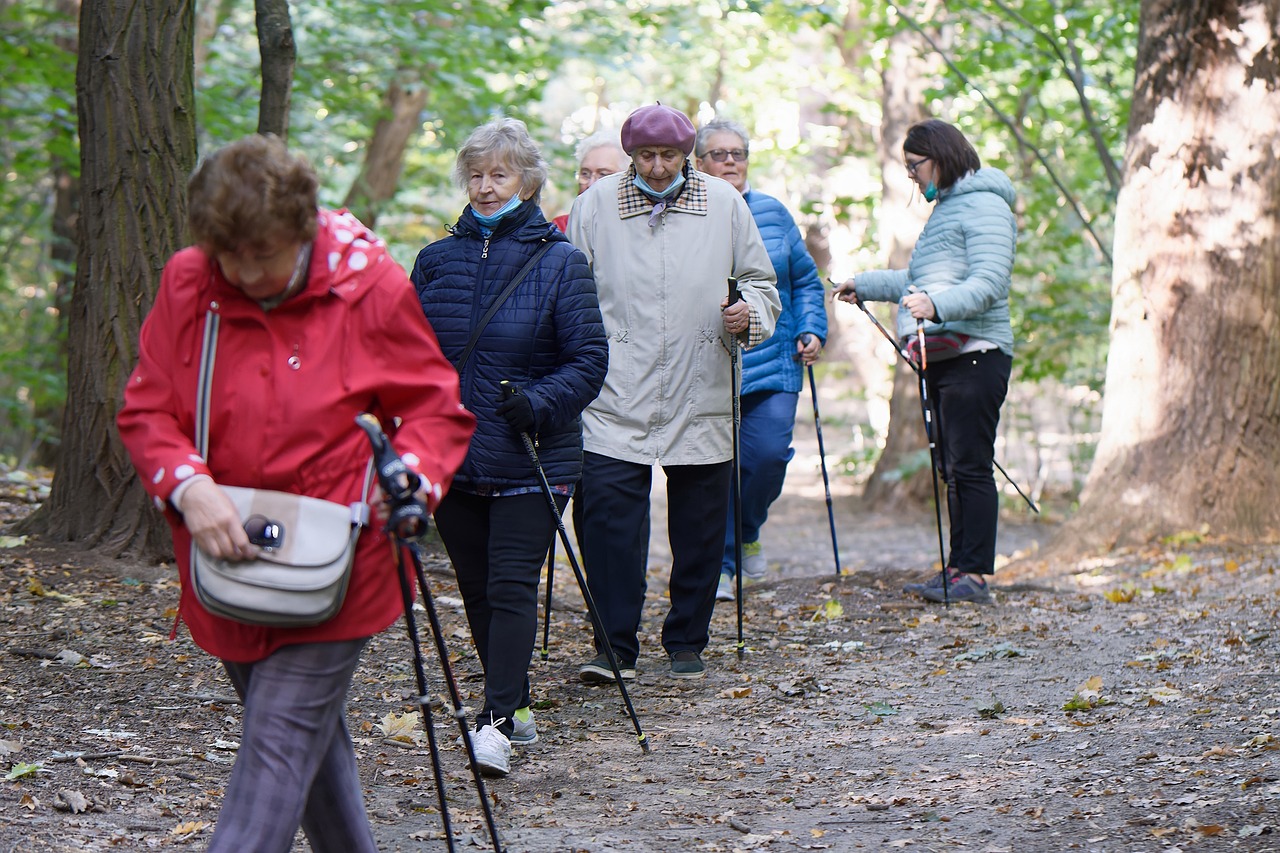
Dietary Considerations for Dental Health
When it comes to maintaining your senior pet's dental health, diet plays a pivotal role. Just like humans, our furry friends can benefit immensely from a well-balanced diet that not only nourishes their bodies but also promotes healthy teeth and gums. It’s essential to understand that the food you provide can either contribute to or combat dental problems. So, what should you be looking for?
First and foremost, consider choosing high-quality pet food that is specifically formulated for dental health. Many brands offer products designed to reduce plaque and tartar buildup, which can be a significant issue for older pets. These foods often have a texture that helps scrub the teeth as your pet chews, providing a mechanical cleaning effect. Look for ingredients that include natural fibers and nutrients that support oral hygiene.
Another important aspect is the inclusion of dental chews and treats in your pet's diet. These treats not only satisfy your pet’s chewing instinct but also help in maintaining their dental health. Many dental chews are designed to be tough enough to withstand chewing, which helps to scrape away plaque and tartar. Additionally, they can be fortified with vitamins and minerals that aid in overall health. For instance, treats containing chlorophyll can help combat bad breath, while those enriched with omega fatty acids can support gum health.
| Type of Food/Treat | Benefits |
|---|---|
| Dental-Friendly Pet Food | Reduces plaque and tartar buildup, promotes overall dental health. |
| Dental Chews | Mechanically cleans teeth, freshens breath, and provides nutritional benefits. |
| Raw Vegetables | Crunchy texture helps clean teeth; good source of vitamins. |
Additionally, incorporating raw vegetables into your senior pet's diet can also be beneficial. Crunchy veggies like carrots or celery can provide a natural cleaning effect on their teeth while offering essential nutrients. Just be sure to introduce any new foods gradually and monitor your pet for any adverse reactions.
Don’t forget to consult with your veterinarian about the best dietary options for your senior pet. They can provide personalized recommendations based on your pet’s specific health needs and dietary restrictions. After all, ensuring your pet has a healthy mouth is not just about avoiding bad breath; it’s about enhancing their overall quality of life!
- What are the best foods for senior pets to maintain dental health?
Look for high-quality pet foods that are specifically formulated for dental health, as well as dental chews and treats that promote oral hygiene. - How often should I brush my senior pet's teeth?
Ideally, you should brush your pet's teeth daily. However, even a few times a week can make a significant difference. - Can dental problems affect my senior pet's overall health?
Yes, poor dental hygiene can lead to serious health issues, including infections that can affect other organs.
Choosing Dental-Friendly Pet Food
When it comes to maintaining your senior pet's dental health, the food you choose plays a vital role. Just like humans, pets can benefit from a diet that not only nourishes them but also helps in keeping their teeth and gums healthy. So, how do you select the right food that promotes dental hygiene? Here are some important factors to consider:
First and foremost, look for pet foods that are specifically labeled as dental-friendly. These products are often designed with unique textures and shapes that help scrub away plaque and tartar as your pet chews. For example, kibble that is larger or has a special coating can provide a mechanical cleaning effect, reducing the buildup of harmful bacteria in the mouth.
Additionally, consider the ingredients in the food. Foods that contain natural additives like seaweed or baking soda can help in controlling plaque. Some brands even include specific enzymes that work to break down plaque and tartar, making it easier for your pet to maintain a clean mouth. Always check the ingredient list and opt for products that prioritize dental health.
Another aspect to keep in mind is the size and shape of the food. Larger pieces of kibble can encourage chewing, which is essential for dental health. In contrast, smaller, softer pieces might not provide the same level of mechanical cleaning. If your pet has difficulty chewing due to dental issues, you may want to consider a mix of both dry and wet foods to ensure they are still getting the necessary nutrients without compromising their comfort.
It's also beneficial to consult with your veterinarian when choosing dental-friendly pet food. They can provide personalized recommendations based on your pet's health history and specific needs. Sometimes, a vet might suggest a prescription diet that is specially formulated for pets with dental issues.
In summary, selecting the right dental-friendly pet food can significantly influence your senior pet's oral health. By focusing on the right ingredients, textures, and consulting with your vet, you can help ensure that your furry friend maintains a healthy smile well into their golden years.
- What are the signs that my pet needs dental care? Look for bad breath, difficulty eating, and excessive drooling as potential indicators.
- How often should I brush my pet's teeth? Ideally, you should brush your pet's teeth several times a week, if not daily.
- Can dental-friendly food replace regular veterinary check-ups? No, while dental-friendly food helps, regular check-ups are essential for comprehensive dental care.
Benefits of Dental Chews and Treats
When it comes to maintaining your senior pet's dental health, dental chews and treats are more than just tasty snacks; they are a vital part of an effective oral hygiene routine. Think of these chews as the toothbrushes of the pet world! They not only satisfy your furry friend's chewing instincts but also help combat the buildup of plaque and tartar. The act of chewing itself can be incredibly beneficial, as it promotes saliva production, which is nature's way of keeping teeth clean and gums healthy.
One of the most significant advantages of dental chews is their ability to provide mechanical cleaning for your pet's teeth. As they gnaw on these treats, the abrasive texture works to scrub away food particles and plaque, much like how our toothbrushes work. This is particularly important for senior pets, who may not be as diligent about chewing their food thoroughly. By incorporating dental chews into their diet, you can help ensure that their teeth remain cleaner for longer periods.
Additionally, many dental chews are formulated with ingredients that can promote fresh breath and overall oral health. Some contain natural enzymes that target bad breath-causing bacteria, while others may include additives like chlorophyll or peppermint to enhance freshness. This means that not only are you supporting your pet's dental health, but you're also making cuddle time a lot more pleasant!
It's crucial to choose dental chews that are appropriate for your pet's size and chewing habits. For instance, a small dog may require a different type of chew compared to a larger breed. Look for products that have the Veterinary Oral Health Council (VOHC) seal, which indicates they meet specific standards for effectiveness in reducing plaque and tartar. Always supervise your pet while they enjoy their chews to prevent any choking hazards.
In summary, dental chews and treats are a fantastic way to enhance your senior pet's dental health. They offer a blend of pleasure and practicality, ensuring that your furry companion not only enjoys their snack but also benefits from it. By integrating these into your pet's daily routine, you're taking a proactive step towards maintaining their oral hygiene and overall well-being.
- How often should I give my senior pet dental chews? It's generally recommended to offer dental chews a few times a week, but always check with your veterinarian for personalized advice based on your pet's specific needs.
- Are all dental chews safe for senior pets? Not all dental chews are created equal. Look for those specifically designed for senior pets and always supervise them while chewing.
- Can dental chews replace regular teeth brushing? While dental chews are beneficial, they should complement regular brushing and professional cleanings, not replace them.
- What should I look for in a dental chew? Choose chews that have the VOHC seal, are appropriate for your pet's size, and contain ingredients that promote dental health.
Frequently Asked Questions
- Why is dental health important for senior pets?
Dental health is crucial for senior pets because poor oral hygiene can lead to serious health issues, including infections and systemic diseases. Just like in humans, maintaining healthy teeth and gums can prevent a host of other problems down the line.
- What are the signs of dental problems in senior pets?
Common signs of dental issues in senior pets include bad breath, difficulty eating, excessive drooling, and visible tartar buildup. If you notice any of these symptoms, it’s essential to schedule a veterinary check-up to address potential problems early.
- What are the common dental diseases affecting older pets?
Older pets are particularly prone to periodontal disease and tooth decay. Awareness of these conditions can help you take proactive measures to seek treatment and implement preventive care to keep your furry friend healthy.
- How can I prevent dental diseases in my senior pet?
Preventive care is key! Regular brushing, offering dental treats, and scheduling professional cleanings are vital components of an effective oral hygiene routine. Think of it as a dental workout for your pet!
- What dietary considerations should I keep in mind for my senior pet’s dental health?
Choosing the right food and treats can significantly impact your pet's dental health. Look for dental-friendly pet food specifically formulated to reduce plaque and tartar buildup. It’s like giving your pet a tasty toothbrush!
- Are dental chews and treats effective for maintaining dental health?
Absolutely! Dental chews and treats not only provide a fun way for your pet to clean their teeth, but they also offer nutritional benefits. They work mechanically to help remove plaque while your pet enjoys a tasty snack!



